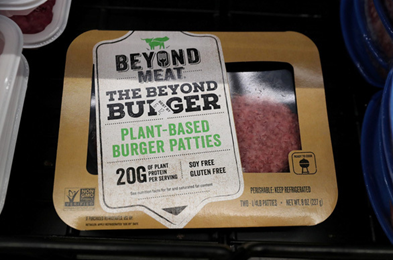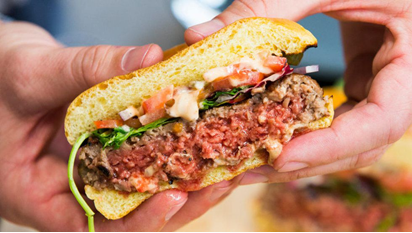The global population will reach about 10 billion by 2050, putting great pressure on food, especially meat production. The solution to develop artificial meat instead of conventional meat will contribute to environmental protection and in some ways, it is better for the health of consumers. So what is artificial meat?
Artificial meats are conventional meat substitutes, providing proteins for the human body. Currently, scientists and some businesses around the world have researched to create some artificial meats from plants, from animal cells, from CO2. Artificial meat is in the form of a powder or formed in the form of a ball, bar, cake ...
Plant-based meat is produced by obtaining protein from plant sources such as soybeans and wheat. These proteins are heated, extruded, and cooled to form a meat-like texture, which is ultimately added with other ingredients and additives (e.g. adding red radish juice to mimic blood or adding oil. coconut, canola oil for fat-like products ...).
Cell-cultured meat, also known as in vitro meat, lab-grown meat, synthetic meat, is born by how to grow animal muscle cells in a controlled environment. Nutrients that are not synthesized by muscle cells such as iron and vitamin B12 will be added in the culture medium to produce products with nutritional value equivalent to conventional meat. The Dutch start-up Mosa Meat says that, in theory, a single cow cell sample can produce up to 10,000 kilograms of cultured meat, with the production process requiring 99 percent less soil and 96 percent less water. With traditional farming (that means only 150 cows instead of the current 1.5 billion to meet the world's beef demand). The cultured cells double in number every 2 days, meaning cultured meat can be produced much faster than conventional meat. Aleph Farms Company (Israel) announced it can produce a batch of cultured steak in three weeks, much shorter time than nearly 2 years to raise a cow.
In November 2019, an American startup named Air Protein announced that it had technology in hand to make meat from CO2 - the gas that is considered the culprit of global warming. To make meat from the air, Air Protein relies on hydrogenotrophic bacteria, which are bacteria that can synthesize fiber cells from CO2. This metabolism is similar to fermentation to yogurt or beer fermentation. Accordingly, with the fermentation vessels containing bacteria, the scientists brought in CO2 along with water and many minerals. The resulting product is a light brown powder that contains 80% protein but has no taste. From this ingredient, after mixing with other ingredients, manufacturers can make many different foods such as pork, turkey, protein cake, meat for hamburgers, ... nutritious, this airborne meats are made up of 9 essential amino acids like that of "real meat". The type of meat of Air Protein also contains many vitamins like B12, more than the "vegetarian meats" that can cause a lack of quality for those who choose a vegetarian diet.
However, up to now, artificial meat has not been as delicious as regular meat, and is not entirely free of potential health risks. So in the next few years, hopefully there will be packages of pork, beef and chicken protein that taste similar to regular meat but are cleaner, safer and better than animal meat are raised on farms.
    |
 |
| Figure 1. Meat from vegetables of Beyond Meat Company. |
    |
 |
| Figure 2. Artificial hamburgers |
1.https://www.idtechex.com/en/research-article/what-will-happen-to-the-cultured-meat-industry-in-2020/19210.
2. https://www.idtechex.com/de/research-report/plant-based-and-cultured-meat-2020-2030/702.
3.https://linadaichi.com/2020/02/17/will-cultured-meat-soon-be-a-common-sight-in-supermarkets-across-the-globe/.
4.https://www.forbes.com/sites/briankateman/2020/02/17/will-cultured-meat-soon-be-a-common-sight-in-supermarkets-across-the-globe/#7b5bf9b47c66.
5.https://www.cnbc.com/2020/02/06/beyond-meat-impossible-foods-face-new-powerful-fake-meat-foe.html.
6.https://www.washingtonpost.com/technology/2020/01/06/impossible-foods-is-finally-making-new-fake-meat-pork/.
7. https://www.marketsandmarkets.com/PressReleases/cultured-meat.asp.
8. www.mosameat.com.